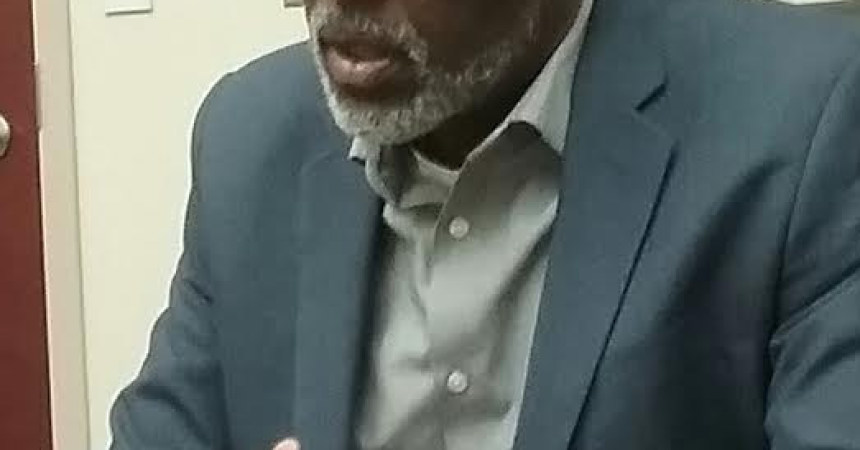
FAMU makes push to improve failing pharmacy test scores
By St. Clair Murraine
Outlook staff writer
FAMU is moving at warp speed to bring its college of pharmacy curriculum up to a standard that would help its students pass the North American Pharmacist Licensure Examination on their first try.
The changes that are being implemented by Michael Thompson, dean of College of Pharmacy and Pharmaceutical Sciences, come amidst what amounts to the 2016 class failing the test that is commonly known as NAPLEX. The last class of students that took the exam for the first time averaged a 59.3 score, lowest in the 66-year history of the pharmacy program.
“When we got the results back in October, we were freaked out,” Thompson said during a recent interview with the Capital Outlook. “We knew we had a problem.”
In addition to measures that Thompson will take to improve test scores, interim president Larry Robinson recently named Maurice Edington, Ph.D., vice president for strategic planning, analysis and institutional effectiveness.
Edington is the founding dean of the FAMU College of Science and Technology. His new role is to create a blueprint for the University’s progress towards meeting academic, fiscal and operational priorities within the next five years.
“The establishment of this position highlights the importance of effectively implementing FAMU’s existing and proposed priorities and excelling in the performance funding metrics established by the Florida Board of Governors,” said Robinson.
Students’ response to their testing experience also helped to hasten the move to improve their preparation, Thompson said
“Student came back saying,’ this wasn’t just a simple case,” Thompson said. “This was a detailed case and there were so many of them.”
Admittedly, Thompson said part of the problem that the students faced was in having to take a test that had a different blueprint than what they’d prepared for. Two major issues they faced were that some questions on the test had multiple correct answers and the testing time increased from four to six hours.
The number of questions also increased from 185 to 250, he said, pointing out that the national average test results declined by about 12 points.
Prior to the significant drop that put FAMU students in the lowest percentile, FAMU pharmacy student scored well between 2012 and 2015. During that span, the high average was 88 percent and the low was 85 percent. These scores were within the requirements of the accreditation agency.
The drop was obviously worrisome to Thompson, who became dean of pharmacy program in 2012 and had seen it go through periods of probation, although not necessarily for low test scores.
“It doesn’t feel good when it happen,” he said. “No; it doesn’t. When you look up and you see an 89 percent, 85, 87, 89 and then 59. That shocks you. That shakes you and that’s why we are getting right on it.”
FAMU has no time to lag on putting in place a curriculum that Thompson has been addressing aggressively, as the program could face its first probation since 2006. Between that time and when Thompson became dean seven years ago, the college of pharmacy had several short-term approvals from the Accreditation Council for Pharmacy Education.
The program is currently in full compliance, a status it attain after meeting ACPE standards, which included increasing faculty salaries in addition to curriculum changes.
Thompson began to put in motion a curriculum last December with the intention of enabling students to get better results. He and his faculty used the Christmas break last year to create a board review for the students that involved a midweek video conference for student in Miami, Jacksonville, Orlando, Tampa and Crestview.
The content of the review is from a system called Access Pharmacy, which applies the latest cases for students to practice with them. Thompson said the review will intensify in April with a high-stakes comprehensive exam, which he said will be a sure-fire indication whether students would be able to pass the NAPLEX exam.
Students who don’t pass the mock test will get an incomplete and repeat the review in the summer, he said.
Additionally, FAMU recently purchased Pre-NAPLEX, which is a practice exam of 100-questions to help prepare students to become used to the testing format and content. The idea is to help students understand what they will experience during the real test, he said. A planned three-day conference with students is yet another step that Thompson said will be taken to assure success on the mandatory test for acquiring a license to practice in pharmacy.
“We really are working with them to make this right,” he said. “On the classes behind them, those deficiencies have all been completely implemented.”
But despite the 2016 score, FAMU maintains accreditation through 2022 from the APCE. However, Thompson could expect be warned by APCE to about the low scores. Along with that, it’s not an uncommon practice for the accreditation council to question a university when its students turn in low scores or go from failing to doing extremely well, he said.
Meanwhile, at least one former dean of pharmacy and a former student of the program are confident that the low scores can be fixed.
C.C. Cunningham, a product of FAMU’s college of pharmacy who now works in the school’s pharmacy, said he would like to see the days when FAMU students traditionally would present research work at national contest.
“In many of those meetings, they would rate first class,” Cunningham said.
Former dean of the school of pharmacy Henry Lewis said improving students’ chances making passing scores on the NAPLEX test will require constant improvement to keep the program relevant.
“They have to do a lot of work,” said Lewis, who also served a six-month stint as interim president at FAMU in 2002. “When you’ve got a problem, you’ve got to focus all your time and resources on fixing that problem.”







